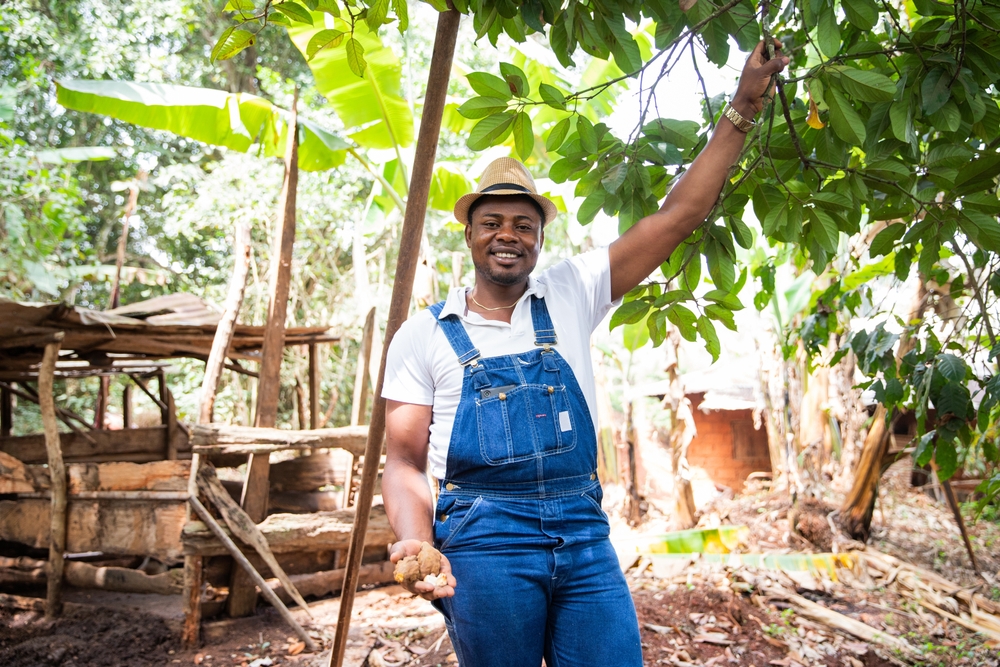I have been traveling to West Africa since I was a child. My parents first sent me to Senegal to study Islam and have a respite from the streets of East New York. Nestled in Medina Baye, a deeply spiritual town located in the district of the rural province of Kaolack, I was immersed headfirst into a new culture. One of the first and most lasting impressions of my time there was the fascinating foodways. Eating lamb and rice from a communal food bowl, enjoying local delights like homemade popsicles made from the fruit of the baobab tree, and enjoying the deliciously rich stews imbued with spices and ginger, Senegal opened my palate to new ways of nourishing myself.
Many ingredients were familiar to me, but there was one particular item that had a familiar name but a markedly different appearance, substance, and taste. Kola nuts are a powerful and vibrant part of West African culture that I was blessed to witness up close.
In Senegal, as in many West African cultures, kola nuts are used as a form of currency and a marker of traditional hospitality. Exploring local markets and engaging with the welcoming locals, I quickly learned about the significant role kola nuts played in the daily lives of many communities. It was intriguing to witness the deep-rooted cultural significance attached to these small, reddish-brown nuts. They were not just ordinary nuts; they were revered as a symbol of hospitality, friendship and even spiritual connections.
It is not uncommon to see a large bag of kola nuts being presented at the masjid to mark the commencement of a wedding. Kola nuts are often included as a part of the gift passed from one family to the next, the eating of which symbolizes a solidifying the now cemented relationship between newly formed kin. Rites of passage like weddings are not always extravagant affairs in many Senegalese villages; the normalcy and importance of marriage have been inculcated into the culture such that extravagant affairs are not always needed to mark such auspicious occasions. Bride and groom, accompanied by family, sit in the presence of an imam and complete the ceremony in a brief ceremony that begins and ends with prayer. Likewise, it is not unusual to exit the masjid after a wedding, with kola nuts in tow, and walk directly into the Janazah (funeral) prayer, which is prayed over the deceased. The simplicity and the reverence for stages of life are palpable. I was reminded of this on a recent trip back to Senegal as I sat in the masjid witnessing a wedding and the passing of kola nuts as the call to pray Janazah rang out not long after the ceremony was completed.
Curiosity led me to delve further into the nutritional and medicinal properties of kola nuts. I was captivated to learn that they were not only cherished for their symbolic cultural value but also for their numerous health benefits. It amazed me to discover that West Africans had long recognized and utilized the potential of these humble nuts in promoting overall well-being. One of the most outstanding features of kola nuts is their energizing effect. The natural stimulation they provide is invigorating, leaving a person feeling more alert and focused. Kola nuts contain caffeine, theobromine and theophylline, which collectively contribute to increased energy levels, improved focus and enhanced mental alertness. The caffeine content in kola nuts can provide a natural boost, making it an excellent alternative to other caffeinated beverages.

Kola nuts actually have an incredible array of exceptional health benefits. They are packed with antioxidants, which are essential in protecting our cells against damage caused by harmful molecules called free radicals. The high levels of polyphenols and flavonoids found in kola nuts can aid in neutralizing free radicals and reducing oxidative stress, potentially lowering the risk of chronic diseases like cancer and heart disease.
For those looking to manage their weight, kola nuts can be a valuable ally. The caffeine and natural compounds present in kola nuts help suppress appetite and reduce cravings. Additionally, the metabolic effects of kola nuts can support weight management efforts by stimulating thermogenesis, the process of heat production in the body that aids in burning calories. When used by agricultural workers, the effect of the caffeine and metabolism-boosting properties of kola help individuals not only maintain a healthy weight but increase stamina. Kola nuts have also long been used in traditional medicine for their digestive properties. They contain bitter compounds that can stimulate gastric acid production, promote efficient digestion and alleviate symptoms of indigestion. They provide an excellent balance to the rich and often spicy stews and sauces that can be emblematic of West African cuisine.
Some research suggests that kola nuts may possess anti-inflammatory properties. The phytochemicals present in kola nuts, such as tannins, can help reduce inflammation in the body. By mitigating inflammation, kola nuts may contribute to the prevention and management of various inflammatory conditions, such as arthritis and certain skin disorders.
In traditional medicine, kola nuts have been used to address respiratory issues. The bronchodilator properties of kola nuts can help relax the airways, making breathing easier for individuals with conditions like asthma and chronic obstructive pulmonary disease (COPD). However, it’s important to consult a healthcare professional before using kola nuts as a remedy for respiratory conditions. Kola nuts are indeed a superfood that the world has yet to recognize in full. This may be an actual benefit as kola nuts are a critical element of West African culture and their commodification could lead to scarcity. More than just food, though, kola nuts are symbolic of the resilience, multiplicity and power of West African culture.
They are reminiscent of not only my time spent in Africa as a youth, but they are also a reminder of the ties that bind me to the cultures and traditions of my people in Senegal, West Africa.
Words by Kaba Abdul-Fattaah.








